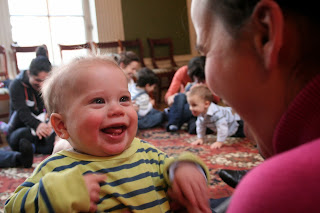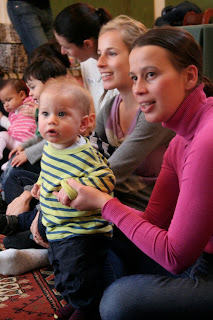Tegye fel a kezét most, aki szoptatás közben még soha nem gondolt arra, milyen jó lenne csak pár órát egyedül tölteni, elmenni sétálni, félnapot vásárolgatni, végre csacsogni egyet a csajokkal - mindezt babakocsi nélkül -, nem is említve a koktélozást, születésnapi party-kat, vacsorákat, koncerteket, színházat.............Normális életet élni, így mondják, nem? Jaaaj, de jó lenne!
Irigy vagyok, pedig én még "csak" hét hónapja szoptatok. Viszont londoni baráti körünkből sokan nem is kezdték el vagy pár hónap után abbahagyták - helyette lefejt tejjel vagy tápszerrel etették a babákat. Na, ők már megtehetik mindazt, ami azon a hosszú kívánságlistán szerepel! Mehetnek ide-oda, a párjukkal vagy anélkül, hiszen az üveget az apa, a nagyi, az anyós vagy a babysitter is tudja tartani. A cicivel már nem ilyen egyszerű...
És amikor a buli-történeteket hallgatom karikás szemekkel, én annyira, de annyira irigy vagyok!
Először nem raktam össze a képet, hogy a brit anyukák miért tudnak olyan gyorsan visszamenni dolgozni, újra eljárni szórakozni vagy összejönni a barátaikkal. Nekem erre még most sincs kapacitásom. Azt sem értettem, hogy a terhesoktatáson miért sulykolták annyira a szoptatás fontosságát. Miért kell erre egy külön félnapot szentelni?! Hát megszületik a baba, aztán rakjuk a cicire, nem? Mi ebben olyan furcsa?
Aztán a múlt héten megértettem. A brit kormány bejelentette, hogy 200 fontos voucher bevezetését tervezi Anglia bizonyos részein a rászoruló anyukák körében - közülük is azok kaphatnák meg és költhetnék a pénzt baba holmira, akik vállalják, hogy hat hónapig kizárólag anyatejet kap a kisbabájuk. És ezzel elindult a lavina és a magyarázkodás: jöttek a statisztikák, grafikonok és egy hatalmas vihar - amit a téma és a média kavart. Hogy miért? Hát vessünk csak egy pillantást a lenti grafikonra! Ezen Magyarország az első helyen szerepel, az Egyesült Királyság pedig az utolsók között kullog - az ábra azoknak az anyukáknak az arányát mutatja, akik még a hatodik hónapban is szoptatnak.

Az ügyben pedig sok a pro és a kontra: az Egészségügyi Világszervezet (WHO) ajánlása szerint a hat hónapig kizárólagosan adott anyatej mindennél erősebb immunrendszerrel vértezi fel az újszülöttet, megóvja bajtól, betegségtől - elsősorban hasmenéstől, megfázástól (habár Ben-nek már mindkettő volt) -, mert a bébi megkapja az anyuka antitestjeit. Ezzel idáig senki nem is vitatkozik. A szoptatás hosszútávú hatásai - például az egészségesebb tinédzserkor, az elhízásra való hajlam hiánya és a jobb tanulmányi eredmény - azonban már nem ennyire egyértelműek. Azok ugyanis, akik szoptatnak, általában gazdagabbak és tanultabbak, így a gyermekeik étrendje és életstílusa is eleve minőségibb - vagyis az anyatejen kívül más faktorok is hozzájárulhatnak ahhoz, hogy ők fittebbek és mondjuk jobban teljesítenek az iskolapadban.
Végül, de nem utolsósorban a tápszert vagy az üveget preferáló anyákra nehezedő nyomás és bűntudatkeltés háborított fel néhányakat.
Nehéz ügy, igaz? Főleg, hogy most, e sorokat gépelve majd elalszom, fájnak a mellbimbóim, és várom Benit, aki legalább a hétvégén az apukájával megy sétálni, de amikor hazaérnek, valószínűleg azonnal a cicire kéredzkedik majd...Kötődik - mert a szoptatással ez is jön. Édes, kicsi kincsem..
Szóval mi a helyes? Jól döntöttem?
És a kilókról még nem is beszéltem. Hogyha nem szoptatsz, nyilván nem tolsz be két péksütit - egy csokisat és egy simát - reggelire, egy hatalmas tiramisut a kiadós ebéd után és egy tábla Montezuma narancsos keserű csokit, hogy lemosd a vacsorát. A tápszeres anyukák szülés után két hónappal már bomba alakkal tologatják a babakocsit, miközben én még mindig bele tudok markolni a hasamba...Én annyira, de annyira irigy vagyok...
Hands in the air, please - those who, while breastfeeding, have never thought how fantastic it would be to spend just a few hours alone, to go for a walk, to do half a day's shopping, finally to chat with the girls - all this without the buggy -, not mentioning the cocktails, birthday parties, dinners, concerts, theatres...............Normal life, we call it, don't we? Auh, how great it would be!
I am envious, although I have been breastfeeding for "only" seven months. However, from our circle of British friends many didn't even start it or gave it up after a few months - they expressed their milk or used formula instead. Well, they can already do all those activities which are still largely off bounds for me! They can go here and there, with or without their partners as the bottle can be held either by daddy, grandma, the mother-in-law or the babysitter. But it is obviously not so simple with the breast...
And when I am listening to those good party-stories with dark shadows under my eyes, I am so-so envious!
At first I didn't put the picture together how British mums can get back to work so quickly, throw themselves in to the night life again or gather together with their friends. I still have no capacity to do so. I also didn't understand why they were so desperate to convince us about the importance of breastfeeding on the NCT class. Why did we have to sacrifice a half-day for this issue? The baby is born and then we put them on the breast, don't we? What else could we do and why does it sound so strange?
Then last week I began to understand. Some parts of the NHS announced that they wanted to introduce a 200 pounds voucher for poorer mothers - for those who choose to exclusively breastfeed their baby for at least six months. They could spend the money on baby stuff in highstreet shops. And with the annoucement an avalanche of explanation started to build: statistics, graphs were published and a storm was stirred up - by mothers and the media. Why? Have a look at the graphics below! In this Hungary appears in the first place but the UK brings up the rear - the diagram shows the percentage of those mums who still breastfeed in the sixth month.

There have been many pro and cons surrounding this issue. According to the World Health Organisation, giving breastmilk for up to six months helps to create a stronger immune system for babies protecting them from illnesses - primarily from diarrhea and colds (however, Ben has already had both) -, because the child also gets his mum's antibodies. There is widespread agreement about it. But the long-term benefits of breastfeeding - for example, whether children become healthier, less obese teenagers - are currently not so clear. This is because those breastfeeding tend to be wealthier, better-educated households who usually have healthier children as their diets and lifestyles are usually superior.
Eventually, there was lots of outrage because of the familiar condemnation of bottle- and formula-feeding mums and because of the pressure under which they are forced to feel guilty.
Difficult issue, isn't it? Especially that now, as I am typing these sentences I could easily fall to sleep, my nipples are very sore and I am waiting for Ben who at least at weekends can be taken for walks by his dad but when they get home, his first thought will probably be to climb on the breast...He bonds - because it also comes with breastfeeding. My little sweetheart...
Well, what is better then? Have I made the right decision?
And I haven't even mentioned the kilos, yet! If you don't breastfeed, you obviously don't push two croissants - one with chocolate and one plain - in to your mouth every morning, a huge tiramisu after your abundant lunch and a whole Montezuma orange and genarium dark chocolate to wash down the dinner. Bottle-feeding mums can push the buggies with their shape back two months after birth while I can still clench my tummy...I am so-so envious...














































